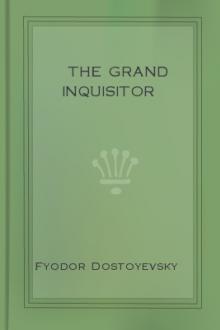The Sorrows of Young Werther by Johann Wolfgang von Goethe (the alpha prince and his bride full story free TXT) 📕

- Author: Johann Wolfgang von Goethe
- Performer: -
Book online «The Sorrows of Young Werther by Johann Wolfgang von Goethe (the alpha prince and his bride full story free TXT) 📕». Author Johann Wolfgang von Goethe
I observed that the good old man inclined his head, and exerted himself to hear our discourse; so I raised my voice, and addressed myself directly to him. “We preach against a great many crimes,”
I observed, “but I never remember a sermon delivered against ill-humour.” “That may do very well for your town clergymen,”
said he: “country people are never ill-humoured; though, indeed, it might be useful, occasionally, to my wife for instance, and the judge.” We all laughed, as did he likewise very cordially, till he fell into a fit of coughing, which interrupted our conversation for a time. Herr Schmidt resumed the subject. “You call ill humour a crime,” he remarked, “but I think you use too strong a term.” “Not at all,” I replied, “if that deserves the name which is so pernicious to ourselves and our neighbours. Is it not enough that we want the power to make one another happy, must we deprive each other of the pleasure which we can all make for ourselves?
Show me the man who has the courage to hide his ill-humour, who bears the whole burden himself, without disturbing the peace of those around him. No: ill-humour arises from an inward consciousness of our own want of merit, from a discontent which ever accompanies that envy which foolish vanity engenders. We see people happy, whom we have not made so, and cannot endure the sight.” Charlotte looked at me with a smile; she observed the emotion with which I spoke: and a tear in the eyes of Frederica stimulated me to proceed.
“Woe unto those,” I said, “who use their power over a human heart to destroy the simple pleasures it would naturally enjoy! All the favours, all the attentions, in the world cannot compensate for the loss of that happiness which a cruel tyranny has destroyed.”
My heart was full as I spoke. A recollection of many things which had happened pressed upon my mind, and filled my eyes with tears.
“We should daily repeat to ourselves,” I exclaimed, “that we should not interfere with our friends, unless to leave them in possession of their own joys, and increase their happiness by sharing it with them! But when their souls are tormented by a violent passion, or their hearts rent with grief, is it in your power to afford them the slightest consolation?
“And when the last fatal malady seizes the being whose untimely grave you have prepared, when she lies languid and exhausted before you, her dim eyes raised to heaven, and the damp of death upon her pallid brow, there you stand at her bedside like a condemned criminal, with the bitter feeling that your whole fortune could not save her; and the agonising thought wrings you, that all your efforts are powerless to impart even a moment’s strength to the departing soul, or quicken her with a transitory consolation.”
At these words the remembrance of a similar scene at which I had been once present fell with full force upon my heart. I buried my face in my handkerchief, and hastened from the room, and was only recalled to my recollection by Charlotte’s voice, who reminded me that it was time to return home. With what tenderness she chid me on the way for the too eager interest I took in everything!
She declared it would do me injury, and that I ought to spare myself. Yes, my angel! I will do so for your sake.
JULY 6.
She is still with her dying friend, and is still the same bright, beautiful creature whose presence softens pain, and sheds happiness around whichever way she turns. She went out yesterday with her little sisters: I knew it, and went to meet them; and we walked together. In about an hour and a half we returned to the town.
We stopped at the spring I am so fond of, and which is now a thousand times dearer to me than ever. Charlotte seated herself upon the low wall, and we gathered about her. I looked around, and recalled the time when my heart was unoccupied and free.
“Dear fountain!” I said, “since that time I have no more come to enjoy cool repose by thy fresh stream: I have passed thee with careless steps, and scarcely bestowed a glance upon thee.” I looked down, and observed Charlotte’s little sister, Jane, coming up the steps with a glass of water. I turned toward Charlotte, and I felt her influence over me. Jane at the moment approached with the glass. Her sister, Marianne, wished to take it from her.
“No!” cried the child, with the sweetest expression of face, “Charlotte must drink first.”
The affection and simplicity with which this was uttered so charmed me, that I sought to express my feelings by catching up the child and kissing her heartily. She was frightened, and began to cry.
“You should not do that,” said Charlotte: I felt perplexed. “Come, Jane,” she continued, taking her hand, and leading her down the steps again, “it is no matter: wash yourself quickly in the fresh water.” I stood and watched them; and when I saw the little dear rubbing her cheeks with her wet hands, in full belief that all the impurities contracted from my ugly beard would be washed off by the miraculous water, and how, though Charlotte said it would do, she continued still to wash with all her might, as though she thought too much were better than too little, I assure you, Wilhelm, I never attended a baptism with greater reverence; and, when Charlotte came up from the well, I could have prostrated myself as before the prophet of an Eastern nation.
In the evening I would not resist telling the story to a person who, I thought, possessed some natural feeling, because he was a man of understanding. But what a mistake I made. He maintained it was very wrong of Charlotte, that we should not deceive children, that such things occasioned countless mistakes and superstitions, from which we were bound to protect the young. It occurred to me then, that this very man had been baptised only a week before; so I said nothing further, but maintained the justice of my own convictions. We should deal with children as God deals with us, we are happiest under the influence of innocent delusions.
JULY 8.
What a child is man that he should be so solicitous about a look!
What a child is man! We had been to Walheim: the ladies went in a carriage; but during our walk I thought I saw in Charlotte’s dark eyes — I am a fool — but forgive me! you should see them, — those eyes. — However, to be brief (for my own eyes are weighed down with sleep), you must know, when the ladies stepped into their carriage again, young W. Seldstadt, Andran, and I were standing about the door. They are a merry set of fellows, and they were all laughing and joking together. I watched Charlotte’s eyes.
They wandered from one to the other; but they did not light on me, on me, who stood there motionless, and who saw nothing but her!
My heart bade her a thousand times adieu, but she noticed me not.
The carriage drove off; and my eyes filled with tears. I looked after her: suddenly I saw Charlotte’s bonnet leaning out of the window, and she turned to look back, was it at me? My dear friend, I know not; and in this uncertainty I find consolation. Perhaps she turned to look at me. Perhaps! Good-night — what a child I am!
JULY 10.
You should see how foolish I look in company when her name is mentioned, particularly when I am asked plainly how I like her.
How I like her! I detest the phrase. What sort of creature must he be who merely liked Charlotte, whose whole heart and senses were not entirely absorbed by her. Like her! Some one asked me lately how I liked Ossian.
JULY 11.
Madame M— is very ill. I pray for her recovery, because Charlotte shares my sufferings. I see her occasionally at my friend’s house, and to-day she has told me the strangest circumstance. Old M—
is a covetous, miserly fellow, who has long worried and annoyed the poor lady sadly; but she has borne her afflictions patiently.
A few days ago, when the physician informed us that her recovery was hopeless, she sent for her husband (Charlotte was present), and addressed him thus: “I have something to confess, which, after my decease, may occasion trouble and confusion. I have hitherto conducted your household as frugally and economically as possible, but you must pardon me for having defrauded you for thirty years.
At the commencement of our married life, you allowed a small sum for the wants of the kitchen, and the other household expenses.
When our establishment increased and our property grew larger, I could not persuade you to increase the weekly allowance in proportion: in short, you know, that, when our wants were greatest, you required me to supply everything with seven florins a week. I took the money from you without an observation, but made up the weekly deficiency from the money-chest; as nobody would suspect your wife of robbing the household bank. But I have wasted nothing, and should have been content to meet my eternal Judge without this confession, if she, upon whom the management of your establishment will devolve after my decease, would be free from embarrassment upon your insisting that the allowance made to me, your former wife, was sufficient.”
I talked with Charlotte of the inconceivable manner in which men allow themselves to be blinded; how any one could avoid suspecting some deception, when seven florins only were allowed to defray expenses twice as great. But I have myself known people who believed, without any visible astonishment, that their house possessed the prophet’s never-failing cruse of oil.
JULY 13.
No, I am not deceived. In her dark eyes I read a genuine interest in me and in my fortunes. Yes, I feel it; and I may believe my own heart which tells me — dare I say it? — dare I pronounce the divine words? — that she loves me!
That she loves me! How the idea exalts me in my own eyes! And, as you can understand my feelings, I may say to you, how I honour myself since she loves me!
Is this presumption, or is it a consciousness of the truth? I do not know a man able to supplant me in the heart of Charlotte; and yet when she speaks of her betrothed with so much warmth and affection, I feel like the soldier who has been stripped of his honours and titles, and deprived of his sword.
JULY 16.
How my heart beats when by accident I touch her finger, or my feet meet hers under the table! I draw back as if from a furnace; but a secret force impels me forward again, and my senses become disordered. Her innocent, unconscious heart never knows what agony these little familiarities inflict upon me. Sometimes when we are talking she Iays her hand upon mine, and in the eagerness of conversation comes closer to me,





Comments (0)